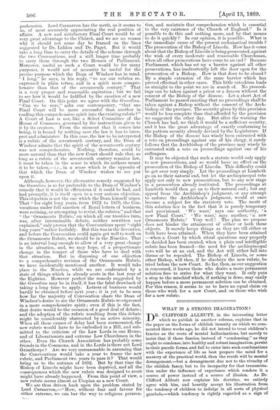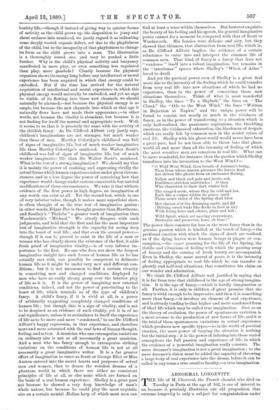WHAT IS A STRONG IMAGINATION? D R. CLIFFORD ALLBUTT, in the
interesting letter which we publish in another column, explains that in the paper on the forms of childish insanity on which we com- mented three weeks ago, he did not intend to treat children's fancies as the roots of mental hallucinations, but merely to insist that if those fancies, instead of " condensing," as they ought to condense, into healthy and robust imagination, persist in their puerile forms, and fail to enter into such combinations with the experience of life as best prepare the mind for a mastery of the practical world, then the result will be mental derangement,—but a derangement due not to the vivacity of the childish fancy, but to its incapacity for that transmuta- tion under the influence of experience which renders it a source of power instead of a source of illusion. As Dr. Clifford Allbutt now explains his doctrine, we entirely agree with him, and heartily accept his illustration from the tendency of children to indulge in all sorts of physical gambols,—which tendency is rightly regarded as a sign of healthy &a—though if instead of giving way to quieter forms of activity as the child grows up, the disposition to jump and shout endures into manhood, we justly regard it as indicating some deeply rooted organic defect, not due to the playfulness of the child, but to the incapacity of that playfulness to change its form as the child grows into a man. The illustration is a thoroughly sound one, and may be pushed a little further. Why is the child's physical activity and buoyancy manifested in mere play, or even something less regulated than play, mere gambols ? Clearly because the physical organism shows its energy long before any intellectual or moral experience has been acquired in which that energy could be embodied. But if the time has arrived for the natural acquisition of intellectual and moral experience in which this physical energy would naturally be embodied, and yet no sign be visible of its flowing into these new channels, we should naturally be alarmed,—not because the physical energy is so ample, but because the new channels into which at that age it naturally flows have not made their appearance ;—in other words, not because the vitality is abundant, but because it is not finding for itself the normal and appropriate work. Well, it seems to us that it is precisely the same with the activity of the childish fancy. As Dr. Clifford Allbutt very justly says, children's imaginations are not stronger, but much weaker than those of men. Hartley Coleridge's childhood was full of signs of imaginative life, but of much weaker imaginative life than Hartley Coleridge's manhood. Sir Walter Scott's childhood was full of signs of imaginative life, but of much weaker imaginative life than Sir Walter Scott's manhood. What is the test of a strong imagination ? We should say that it is mainly the power of realising and expressing vividly the actual forms which human experience takes under given circum- stances, and in a less degree the power of conceiving how that experience would change under various conceivable but untried modifications of those circumstances. We take it that without evidence of the first power in high degree, no imagination of any worth can exist at all. Yet the second test, which is one of very inferior value, though it makes more superficial show, is often thought of as the true test of imaginative genius : in other words, Edgar Poe is thought greater than Hawthorne, and Southey's " Thalaba " a greater work of imagination than Wordsworth's " Michael." We utterly disagree with such judgments, and hold that the first and far the most important test of imaginative strength is the capacity for seeing deep into the heart of real life ; and that even the second power,— though if it can be proved to exist in the life of a man or woman who has clearly shown the existence of the first, it adds fresh proof of imaginative vitality, is of very inferior im- portance to the first. No one who does not show the deepest imaginative insight into such forms of human life as he has actually met with, can possibly be competent to delineate human life as it might be under very new and different con- ditions; but it is not uncommon to find a certain vivacity in conceiving new and changed conditions, displayed by men who have no really strong grasp over the interior play of life as it is. It is the power of imagining new external conditions. indeed, and not the power of penetrating to the heart of life, which reminds us of the type of children's fancy. A child's fancy, if it is vivid at all, is a power of arbitrarily suggesting completely changed conditions of human life ; but though this is a sign of vitality, and is not to be despised as an evidence of such vitality, yet it is of no real significance, unless it so assimilates to itself the experience of life as to be more and more " condensed,"to use Dr. Clifford Allbutt's happy expression, in that experience, and therefore more and more saturated with the real laws of human thought, feeling, and action. A musician who can extemporise variations on ordinary airs is not at all necessarily a great musician. And a man who has fancy enough to extemporise striking variations on the conditions of human life is not at all necessarily a great imaginative writer. It is a far greater effort of imagination to enter as Scott or George Eliot or Miss Austen entered into the secret hearts and purposes of actual men and women, than to dream the weirdest dreams of a phantom world in which there are either no consistent principles of life at all, or else none which are formed on the basis of a real human experience. Shelley is a great poet not because he showed a very deep knowledge of man's whole nature, but because he could play the most exquisite airs on a certain mental .Eolian harp of which most men can find at least a trace within themselves. But however exquisite the beauty of his feeling and his speech, his general imaginative power cannot for a moment be compared with that of Scott or Wordsworth. His fancies were delicate and airy, but they showed that thinness, that abstraction from real life, which is, as Dr. Clifford .Allbutt implies, the evidence of a certain reluctance to enter into and interpret the common life of common men. That kind of fancy is a fancy that does not " condense " itself into a robust imagination, but remains in.
the " interlunar " spaces where Shelley's " W itch of Atlas " loved to dwell.
And yet the poetical power even of Shelley is a great deal more due to the intensity of the feeling which he could transfer from very real life into new situations of which he had no experience, than to the power of conceiving those new situations themselves. Think of what is most wonderful in Shelley, the lines " To a Skylark," the lines on " The Cloud," the " Ode to the West Wind," the lines " Written in Dejection at Naples," and the unique power will be found to consist not nearly so much in the vividness of fancy, as in the power of transferring to a situation which is only half-realised, the passionate aspirations, the throbbing emotions, the vividness of exhaustion, the blankness of despair, which are really felt by common men in the muter crises of real life. Shelley with his ghost-world would never have been a great poet, had he not been able to throw into that ghost- world all and more than all the intensity of feeling of which the most sensitive men are conscious in real life. What can be more wonderful, for instance, than the passion which Shelley transfuses into his invocation to the West Wind?— "0 Wild West Wind, thou breath of Autumn's being, Thou from whose unseen presence the leaves dead Are driven like ghosts from an enchanter fleeing,
Yellow and black and pale and hectic red, Pestilence-stricken multitudes ! 0 thou Who chariotest to their dark winter bed The winged seeds, where they lie cold and low, Each like a corpse within its grave, until Thine azure sister of the Spring shall blow Her clarion o'er the dreaming earth, and fill (Driving sweet buds like flocks to feed in air) With living hues and odours, plain and hill : Wild Spirit, which art moving everywhere, Destroyer and preserver, hear, oh hear !"
The power there consists far less in the mere fancy than in the genuine passion which is kindled at the touch of fancy,—the profound emotion with which the signs of death are realised, as if the dying leaves were human beings in plague or con- sumption,—the eager yearning for the life of the Spring, the thrills and vibrations of feeling with which the passing away of beauty and the coming of fresh beauty are accompanied. Even in Shelley, the most unreal of poets, it is the intensity of feeling appropriate to real life which he can transfer to ghostly and half-real situations, that constitutes his claim on our wonder and admiration.
We think Dr. Clifford Allbutt well justified in saying that it is far from true that childhood is the age of strong imagina- tion. It is the age of fancy,—which is hardly imagination at all. Further, it is only in children of great promise that the fancy is vivid enough to be impressive, and then it is something more than fancy,—it involves an element of real experience, and is already tending to that higher and more condensed form of ideal life which may be called true imagination. Just as on the theory of evolution, the power of spontaneous variation is a mere avenue to the production of new forms of life, and it is the trial of these spontaneous variations in actual experience which produces new specific types,—so in the world of poetical creation, the mere power of varying the situation is nothing but the initial step : it is the power of infusing into these varied conceptions the full passion and experience of life, in which the evidence of a powerful imagination really consists. The mere dreamer's imagination is not a great imagination ; to the mere dreamer's vision must be added the capacity of throwing a large body of real experience into the dream, before it can be called in any sense a true creative faculty,—a true imagination.



































 Previous page
Previous page